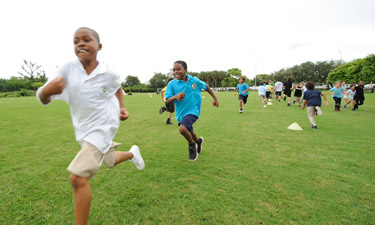 It’s all about diet and exercise. After receiving the first-year results of a three-year study of its afterschool program, Miami-Dade Parks, Recreation, and Open Space is crowing about the community benefits of efforts to improve the health of it young residents.
It’s all about diet and exercise. After receiving the first-year results of a three-year study of its afterschool program, Miami-Dade Parks, Recreation, and Open Space is crowing about the community benefits of efforts to improve the health of it young residents.The analysis by the University of Miami of children ages 6 to 14 who were enrolled in the Miami-Dade County Parks Fit2Play Program during the 2010-11 school year concludes the community-based intervention program is having a positive impact on the health of its participants.
With parental permission, the children who enrolled in the Miami-Dade County Parks Fit2Play Program participated in pre- and post-measurement tests that provided a baseline for determining their fitness levels and nutritional needs, and helped track their progress. Each child’s height and weight measurements were then converted to a BMI age- and sex-adjusted percentile. Waist and hip circumference, along with bicep, tricep, and shoulder blade skinfold measurements were also collected to determine body fat distribution. Physical fitness assessments included a sit-and-reach test, timed sit-up and push-up test, pacer test, and 400-meter run. Key results from the study follow.
Body Mass Index (BMI)—At their baseline testing, 56 percent of the program’s participants were normal weight, 15 percent were overweight, and 28 percent were obese. BMI percentiles did not increase during the school year among participants, indicating the maintenance of normal weight for height, or prevention of overweight/obesity status. While height, waist, and hip circumference increased over the one-year time period, the increase was attributed to normal growth velocity (versus an abnormal increase due to overeating and/or physical inactivity). Collectively, these findings convey that the participants were growing normally, while not gaining weight abnormally.
Blood Pressure—Several participants who had high blood pressure when they began the program lowered their blood pressure as a result of their participation. From baseline to follow-up, the percent of those with high systolic blood pressure significantly decreased from 36.4 percent to 25.7 percent, while those with normal SBP significantly increased from 43.9 percent to 55.1 percent. Similarly, those with high diastolic blood pressure significantly decreased from 16.3 percent to 13.3 percent, while those with normal DBP significantly increased from 55.1 percent to 68.2 percent.
Physical Fitness Tests—Participants significantly improved in all physical fitness tests: sit-and-reach (repetitions averaged 25.7 at baseline and 26.2 at follow up); push-ups (repetitions averaged 21.7 at baseline and 24.9 at follow up); sit ups (repetitions averaged 25.2 at baseline and 28.6 at follow up); 400-meter run (average time decreased from 260.5 seconds at baseline to 201.7 seconds at follow up).
Nutrition Knowledge Assessment—In perhaps the most critical area leading to permanent change in behavior, this group significantly improved in its nutrition knowledge assessment from baseline to post-test (mean change from 6.37 questions correct to 7.3 questions correct). Specifically, in post-testing, 22 percent more children answered “I should limit the amount of TV” and were able to identify soda as the bad drink (versus water) correctly at post-test versus baseline. Similarly, 21 percent more children were able to correctly identify how physical activity improved their health and 20 percent more answered “It is healthy to eat fruits and vegetables at every meal” versus at baseline.
While fees are necessary to recover the costs of funding the program, including staffing and materials, the fees are implemented on a sliding scale to allow families of all economic backgrounds to participate. The sliding scale is made possible through a combined initiative of the Parks Foundation of Miami-Dade and Miami-Dade County, which has created a $300,000 scholarship program for families of children who qualify based on income and family size (similar to the requirements for state and federal aid). That initiative, in conjunction with the partnership between Miami-Dade County Parks and the Children’s Trust, has enabled many families in need of financial assistance to register their children in the Fit2Play Program for free. Miami-Dade County Parks is funded in part by the Children’s Trust, a dedicated source of revenue established by voter referendum to improve the lives of children and families in Miami-Dade County.

